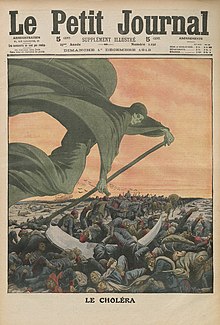1899–1923 cholera pandemic
1899–1923 cholera pandemic
The cholera pandemic of 1899–1923, also known as the sixth cholera pandemic, was the last major cholera outbreak to occur globally and marked the most severe resurgence of the disease since the mid-19th century. Originating in British India, the pandemic spread across Asia, Europe, Africa, and parts of North America, claiming an estimated one million lives. Characterized by widespread waterborne transmission, the pandemic highlighted significant public health deficiencies and inadequacies in sanitation practices. Efforts to combat the outbreak included improvements in water supply and sewage systems, as well as increased medical interventions. The pandemic significantly influenced global health policies and laid the groundwork for future cholera research and prevention strategies.
